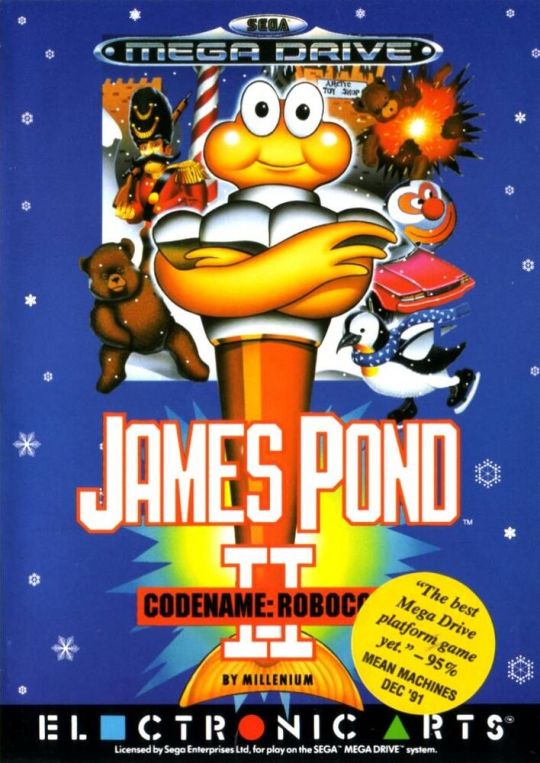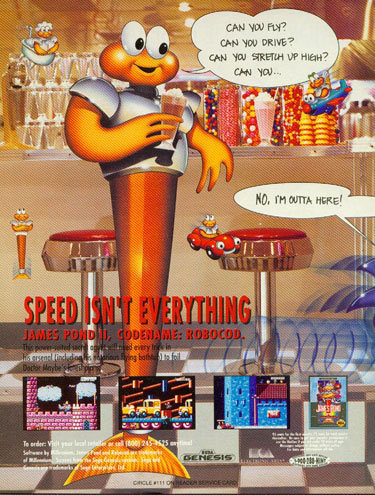#robocod
Explore tagged Tumblr posts
Photo

SEGA Pro #2, Dec '91 - 'James Pond II: Codename Robocod' cover. Support us on Patreon
29 notes
·
View notes
Text

Happy James Pond II Codename: RoboCod to all who celebrate.
#james pond ii codename robocod#james pond#james pond ii#james pond 2#holidays#holiday video games#video games#I've been posting this everywhere#it's the kind of obscure I like
0 notes
Text
Here are seven ways to make programming more engaging for beginners.
Introduction
For newcomers, programming might be frightening. For many, the new material's syntax, logic, and sheer amount might be depressing. Nonetheless, programming doesn't have to be very difficult or tiresome. Programming can be made more engaging and fulfilling by incorporating innovative, enjoyable, and useful methods. This article will examine seven methods for improving novice programmers' engagement, which will make learning programming easier and more pleasurable.
1. Start With Visual Programming Tools
Start with visual programming tools like Scratch, Blockly, or Tynker before writing complex code. Using these platforms, novices can drag and drop code blocks to construct simple programs, games, and animations. Visual tools make learning more interactive and enjoyable by breaking down complicated programming concepts and provide instantaneous visual feedback.
Benefits:
Improves understanding of programming fundamentals.
Allows newcomers to see the effects of their efforts immediately.
Encourages creativity through cartoons and games.
2. Focus On Interactive Learning Platforms
Students can write code directly in their browsers and see the results in real time with interactive classes offered by platforms like Codecademy, Khan Academy, and freeCodeCamp. These platforms often provide assistance or instant feedback and break down programming into manageable tasks. Interactive learning helps users solve difficulties and keeps the learning process moving forward while lowering irritation.
Benefits:
Immediate feedback allows for easy error correction.
Lessons are organised into convenient parts.
Gamified learning systems can help to sustain engagement.
3. Work On Real-Life Projects Early
Learning programming through real-world applications increases its relevance and fun factor. Novices can concentrate on projects that pique their interest, such creating a simple app, automating a tedious task, or creating a personal website. Students get a feeling of purpose from real-world projects, which piques their interest in coding and makes them more enthusiastic about it.
Benefits:
Improves understanding of theoretical concepts.
Increases confidence as students create actual things.
Offers a clear purpose and a sense of accomplishment.
4. Learn Through Games
Learning programming can be facilitated by creating or playing games. Some examples of platforms and games designed specifically for teaching programming are CodeCombat, Robocode, and CheckiO. Through the resolution of code puzzles, students advance in these games that transform coding assignments into adventures.
Benefits:
Creates a fun and competitive learning atmosphere.
Encourages critical thinking and problem-solving skills.
Engages students who may find standard lessons unappealing.
5. Incorporate Pair Programming
When two programmers work together on a single task, it's called pair programming. Real-time code reviews are performed by one person after it has been written. Through discussion and shared knowledge, this collaborative learning approach helps students acquire problem-solving methods while also making programming more socially engaging.
Benefits:
Promotes teamwork and communication skills.
Provides fast feedback and reduces errors.
Helps to overcome learning plateaus through shared expertise.
6. Celebrate Small Wins
Programming can occasionally seem like a laborious process with little payoff, especially when faced with challenging problems. It's crucial to acknowledge small accomplishments in order to stay motivated. Acknowledging successes, no matter how small, can give much-needed morale support.
Benefits:
Encourages an optimistic approach to learning.
Recognising progress helps to boost confidence.
Reinforces a growth mentality, increasing learners’ resilience.
7. Join Coding Communities
Learning to program could be more enjoyable if you're a part of a helpful group. Newcomers can participate in local coding meetings and online forums like Stack Overflow and GitHub. These websites offer opportunities for collaboration, mentoring, and inspiration from people who share similar interests.
Benefits:
Access to a plethora of common knowledge.
Promotes collaboration on open-source initiatives.
Creates a network of mentors and peers to share experiences and insights.
Conclusion
By using these suggestions, learning to program doesn't have to be a daunting task; instead, it can be interesting and fun. In order to keep beginners interested in programming and inspired, we at the School of Coding & AI employ a variety of strategies, including interactive tools, real-world projects, and community involvement.
#coding#programming#branding#marketing#python#commercial#graphic design#student life#study motivation
26 notes
·
View notes
Text
Sega Mega Drive - James Pond 2 Codename Robocod
Title: James Pond 2 Codename Robocod / ジェームスポンドII コードネーム・ロボコッド
Developer: Millennium Interactive / Vectordean
Publisher: Electronic Arts Victor
Release date: 9 June 1993
Catalogue No.: EM20015
Genre: Platform Action

The Mega Drive was home to various Amiga ports, and James Pond 2 is no exception. A sequel to James Pond Underwater Agent; and it is a prequel to James Pond 3 Operation STARFI5H. Looks superb, sounds great, and plays like a platform gamer's dream. Add the fact that the gameplay constantly throws out new challenges and surprises for the player to cope with and you have one of many definitive Mega Drive platformers. The Japanese Mega Drive version has a different title screen borrowed from the Super Famicom version (the western title screen is a bit basic by comparison), and this is one of few examples where a Mega Drive game came with a spine card.



youtube
2 notes
·
View notes
Text
I have James Pond 2: Robocod on PS1, PS2, DS, and Switch.

I do not regret this.
Include ports for different OS/consoles, anniversary editions or similar if it's still essentially the same game, etc.
–
We ask your questions so you don’t have to! Submit your questions to have them posted anonymously as polls.
#also a few other games I have for different consoles for some reason#i often do feel guilty about those#the switch one is digital
8K notes
·
View notes
Text

'James Pond II: Codename: Robocod' Mega Drive (1991)
0 notes
Text
I own 4 copies of Robocod. On 4 different systems. I do not regret this.
I own 4 copies of Robocod. On 4 different systems. I do not regret this. https://ift.tt/KLvNWs0 Submitted August 30, 2024 at 06:00PM by CilanEAmber https://ift.tt/5XKUyQz via /r/gaming
0 notes
Text
Explore the Best Dev Games for Learning Programming
In the realm of programming education, dev games offer an engaging and interactive way for aspiring developers to learn and practice coding skills. These games combine the challenge of problem-solving with the fun of gameplay, making them an effective tool for both beginners and experienced programmers looking to sharpen their coding abilities. This article explores some of the best dev games available today that can aid in learning programming languages and concepts.
1. CodeCombat
CodeCombat is a popular dev game that gamifies learning programming languages such as Python, JavaScript, and more. Players embark on adventures, solving coding challenges to progress through the game. The interactive environment and real-time feedback make it suitable for beginners and advanced learners alike.
2. Codingame
Codingame offers a platform where programmers can solve coding puzzles using various programming languages. The challenges range from simple to complex, allowing developers to improve their coding skills while competing with others in global coding contests. It supports languages like Python, C++, Java, and many more.
3. Human Resource Machine
Human Resource Machine is a puzzle game that teaches programming concepts through visual programming. Players control office workers to complete tasks by programming them with simple commands. It's ideal for understanding algorithms, loops, and conditional logic in a playful setting.
4. Robocode
Robocode is a programming game where players create their own battle robots using Java or .NET. These robots then compete against each other in a virtual arena. It's a hands-on way to learn about object-oriented programming, AI, and strategic thinking while having fun with robot battles.
5. Screeps
Screeps is a unique MMO strategy game where players control units and structures using JavaScript code. It challenges players to manage resources, build structures, and program units to interact with other players in real-time. It's a deep dive into JavaScript programming and AI development.
6. Swift Playgrounds
Swift Playgrounds is an app designed by Apple to teach coding using Swift, their programming language. It offers interactive puzzles and challenges that guide learners through the basics of Swift syntax and concepts. It's perfect for those interested in iOS app development.
7. LightBot
LightBot is a programming puzzle game where players guide a robot through various puzzles using programming logic. It introduces concepts like loops, procedures, and conditionals in a visually appealing manner, suitable for beginners and younger learners.
8. Untrusted
Untrusted is a puzzle game where players must hack their way through a series of challenges using JavaScript. It teaches programming principles such as functions, variables, and control flow while navigating through a narrative-driven game environment.
9. Blockly Games
Blockly Games offers a collection of educational games that teach programming through a visual block-based interface. Games like Maze, Turtle, and Blockly provide a hands-on approach to learning coding basics, making it accessible for beginners of all ages.
10. Elevator Saga
Elevator Saga is a JavaScript coding game where players program elevators to efficiently transport passengers to their destinations. It challenges players to optimize elevator behavior using JavaScript coding skills, offering practical insights into algorithmic efficiency.
0 notes
Text

The second game in the series was "RoboCod"
shrimp snipers in cod of duty always going for the krill shot
47 notes
·
View notes
Text
the weirdest "Yuzu saw it on stream and wants to do it too" to date: James Pond 2: Codename RoboCod, for the Amiga
#billbull was pitched as having even more weird/bad retro game tolerance than dot#I can see it#he's having a blast
1 note
·
View note
Text
Exploring AI Coding Courses for Kids: A Guide to Nurturing Young Tech Enthusiasts
Introduction:
In today's rapidly evolving technological landscape, introducing children to the world of artificial intelligence (AI) and coding has become increasingly crucial. AI coding courses for kids offer a unique opportunity to foster their creativity, critical thinking, and problem-solving skills from an early age. This guide delves into the significance of AI education for youngsters and presents an overview of some compelling AI coding courses tailored for kids.
Why AI Education Matters for Kids:
Future-Proofing: As AI continues to shape various industries, understanding its fundamentals equips children for the careers of the future.
Critical Thinking: AI courses encourage kids to analyze problems, break them down, and develop innovative solutions.
Creativity: Learning to code AI systems sparks imagination, enabling kids to develop applications that address real-world challenges.
Ethical Considerations: Early exposure to AI ethics fosters responsible and conscious AI development.
Top AI Coding Courses for Kids:
"AI Adventures" by CodeKids Academy:
This interactive course uses gamification to teach AI concepts like machine learning and neural networks.
Kids build AI-powered projects like image recognition games and virtual assistants.
"RoboCoder" by TechGenius Institute:
Geared towards younger learners, this course combines robotics and coding to teach AI principles.
Children program and control robots, fostering hands-on AI understanding.
"AI Explorers Club" by KidTech Academy:
With a focus on practical application, this course guides kids through creating AI-driven animations and chatbots.
Ethical AI usage and data privacy lessons are integrated into the curriculum.
"Junior Data Scientist" by FutureCoders:
Designed for slightly older kids, this course introduces data science and AI concepts.
Children learn to analyze data, make predictions, and create simple AI models.
Benefits of these Courses:
Engaging Learning: Interactive activities and projects keep kids motivated and excited about AI.
Real-World Applications: Courses teach skills applicable to real-life scenarios, boosting kids' confidence.
Collaboration: Group projects and online communities foster teamwork and peer learning.
Customized Learning: Courses cater to various age groups and skill levels, ensuring an optimal learning experience.
Conclusion:
As AI becomes an integral part of our lives, introducing children to its wonders through tailored coding courses is a forward-thinking investment. These courses empower kids to harness the potential of AI while cultivating essential skills that will serve them well in the digital age. Whether they aspire to become AI engineers, scientists, or simply want to explore the world of technology, AI coding courses for kids offer a remarkable journey of discovery and growth.
0 notes
Text
7 Ways To Make Programming More Interesting For Beginners
Introduction Programming can be intimidating for beginners. The unfamiliar syntax, logical thinking, and the vast amount of new material can be overwhelming. However, coding doesn't have to be difficult or dull. By introducing creative, fun, and practical methods, learning programming can become both engaging and rewarding. In this post, we’ll explore seven strategies to make coding more enjoyable for beginners, leading to a smoother and more fulfilling learning experience.
1. Start with Visual Programming Tools Before diving into traditional coding, it's helpful to begin with visual programming tools like Scratch, Blockly, or Tynker. These platforms enable beginners to create animations, games, and simple programs by dragging and dropping code blocks. Visual tools break down complex programming concepts while offering immediate feedback, making the learning process more interactive and enjoyable.
Benefits:
Simplifies core programming concepts.
Provides instant feedback and visual results.
Fosters creativity through interactive projects like games and animations.
2. Focus on Interactive Learning Platforms Platforms like Codecademy, Khan Academy, and freeCodeCamp offer interactive coding lessons where students can write code directly in their browsers and receive real-time feedback. These platforms structure programming lessons into manageable sections and provide guidance, keeping learners motivated and reducing frustration.
Benefits:
Instant feedback for quick error correction.
Lessons are broken into easy-to-follow parts.
Gamified features can boost engagement and enjoyment.
3. Work on Real-Life Projects Early Working on real-world projects brings relevance and excitement to learning programming. Beginners can start with projects that interest them, like building a personal website, developing a simple app, or automating repetitive tasks. Real-life projects give learners a sense of purpose and accomplishment, making coding more enjoyable.
Benefits:
Deepens understanding of theoretical concepts.
Builds confidence through creating tangible projects.
Provides a clear sense of achievement and progress.
4. Learn Through Games Games can make learning programming much more engaging. Platforms like CodeCombat, Robocode, and CheckiO turn coding challenges into fun adventures, where students solve puzzles and complete tasks using programming logic.
Benefits:
Creates a fun, competitive learning environment.
Develops critical thinking and problem-solving skills.
Appeals to learners who may find traditional lessons less engaging.
5. Incorporate Pair Programming Pair programming is a collaborative approach where two people work together on a coding task. One person writes the code, while the other reviews it in real-time. This method makes programming a social activity and allows learners to exchange ideas and solve problems together.
Benefits:
Fosters teamwork and communication skills.
Offers immediate feedback and reduces coding errors.
Helps overcome challenges through shared expertise.
6. Celebrate Small Wins Learning programming can feel like a long journey with few immediate rewards, especially when facing difficult challenges. Celebrating small victories—like completing a project or solving a tricky bug—helps keep motivation high. Acknowledging progress, no matter how small, is crucial for maintaining morale.
Benefits:
Promotes a positive attitude toward learning.
Boosts confidence by recognizing achievements.
Reinforces a growth mindset, helping learners build resilience.
7. Join Coding Communities Being part of a supportive community can make learning to code more fun and less isolating. Beginners can join online communities like Stack Overflow, GitHub, or attend local coding meetups. These platforms offer mentorship, collaboration opportunities, and motivation from peers who share similar interests.
Benefits:
Provides access to a wealth of shared knowledge.
Encourages collaboration on open-source projects.
Builds a network of mentors and peers to share insights and experiences.
Conclusion By applying these strategies, learning programming becomes less intimidating and more enjoyable. At the School of Coding & AI, we implement these approaches to make coding engaging for beginners. Through interactive tools, real-world projects, and community support, we aim to inspire curiosity and sustain motivation in our learners.
#coding#programming#branding#marketing#commercial#python#study motivation#graphic design#student life#college life#LearnToCode#BeginnerProgramming#CodingForBeginners#InteractiveLearning#VisualProgramming#RealLifeProjects#PairProgramming#CelebrateSmallWins#CodingCommunity#GamifiedLearning#ProgrammingMadeFun#CodeLearningJourney#CreativeCoding#ProgrammingTips#SchoolOfCoding
0 notes
Video
youtube
Swagger Blonde Quick Plays James Pond 2 Codename RoboCod Sega Master System
#youtube#jamespond#jamespond2#robocod#codename#drmaybe#penguins#usgold#sega master system#8bit#licencetogill#fyp#fypart#tiktok fyp#fypツ#my fyp#sega#foryourpage#foryou#fy#fypage#fypages#foryourpages#8 bit game#fypviral#fyp2023#oldschoolcool#oldisgold#retrogame#retrogaming
2 notes
·
View notes

